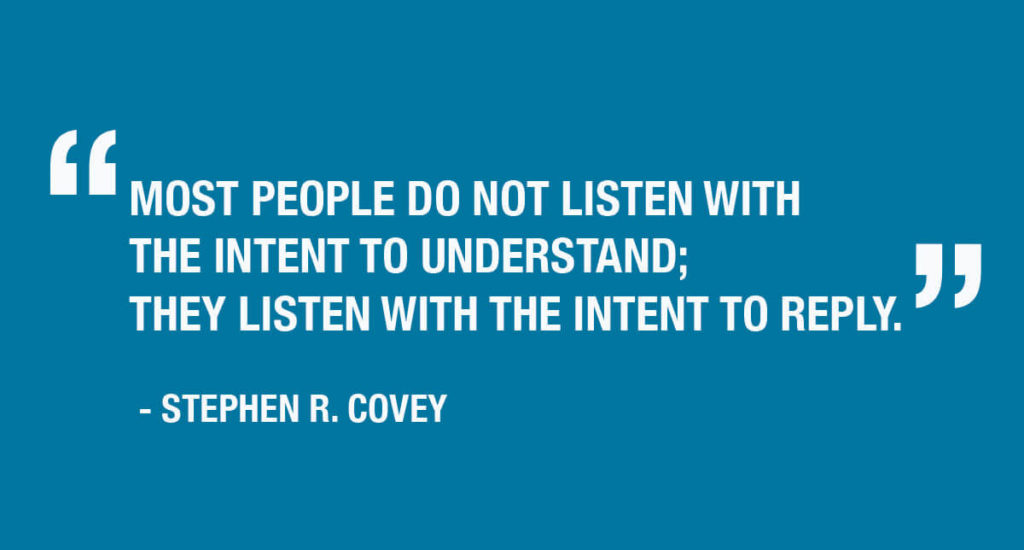
How many people have you encountered in your life who are truly gifted listeners? When I asked myself this question recently, I was honestly surprised with how short my list was.
For me, this reflection was prompted by a conversation I had a couple of weeks ago with my best friend from high school, David Grimm. His mom and dad were like second parents to me, and I deeply miss the conversations I had with his dad, who died a few years ago.
David captured exactly why conversations with his dad were so gratifying. “When Dad talked to you, you were the only other person in the world and nothing was more important than what you were saying in that moment,” he reflected. “It really was a gift.”
Because truly gifted listeners are indeed rare, I believe there is much the rest of us can learn from what they do differently and what motivates them to be such focused communicators. Following is my short list of the gifted listeners I’ve been fortunate to know, and what I’ve learned from each of them.
Listening Expresses Esteem
Stanley Grimm understood better than anyone I’ve ever known that if you wanted to make someone feel good about themselves, you listened to them. And he loved to make other people feel good about themselves! Stan was a long-time Circuit Court judge in my hometown before being named to the Missouri Court of Appeals. Judge Grimm, as everyone in town knew him, understood that those in his courtroom deserved his respect and full attention, regardless of why they were there. And his extraordinary professional approach extended in such a sincere, celebratory way to those of us who knew him personally. I always left a conversation with Judge Grimm feeling like I was the most important person in the world.
Listening Expresses Humility
Connie Lape headed the Social Services department at Southeast Missouri Hospital in Cape Girardeau where I landed my first job in health care many years ago. As a social worker, it probably would not surprise you to hear that Connie was one of the most caring individuals I’ve ever known. But her caring was expressed not by what she said to you, but by how deeply she listened to understand your thoughts, concerns, celebrations and fears. Connie’s humility allows her to always put the other person first. That’s why when I described what characterizes a great communicator in my book The Healing Art of Communication, Connie and the conversations I still remembered with her more than 20 years later came to mind immediately.
Listening Expresses Spirituality
Timm Glover was the head of mission integration for Middle Tennessee Medical Center (now St. Thomas Rutherford Hospital) when I met him over ten years ago. Today, he is the senior vice president for Mission Integration for Ascension Health, the nation’s largest not-for-profit and faith-based health system. I remember the initial meeting with a group at St. Thomas where I met Timm. He didn’t say the most, but it was clear that he was the most engaged in the conversation about how to improve the patient experience because of how he listened and respected the views of everyone else in the room. It you look up the definition of spirituality – “of, relating to, or affecting the human spirit or soul as opposed to material or physical things” – you can begin to understand Timm’s motivation for great listening: he deeply wants to revere and understand your underlying spirit and soul to hear what you’re saying, both verbally and non-verbally.
Listening Expresses Advocacy
Velinda Block, the chief nursing officer of the HCA Tristar Division, is one of the most talented, accomplished chief nursing executives in the country today. I had the privilege of serving as a colleague of Velinda’s at St. Louis Children’s Hospital in the 1990s when she was the CNO during the early, challenging years following the formation of BJC HealthCare. Because the challenges of integration and centralization were especially difficult for our nursing staff, Children’s was the target of two aggressive union organizing efforts. Velinda taught me and all of the other members of the leadership team that what the nurses needed most during this uncertain time was to be heard and appreciated. While all of the standardized pay practices and benefits couldn’t be rolled back, what the nursing staff came to recognize was the strong, professional advocate they had in Velinda. And she expressed that advocacy most meaningfully in the way that she connected and sincerely listened to their concerns, hopes and fears. It is why both organizing efforts were defeated under Velinda’s leadership.
As I think about each of these gifted listeners, what strikes me most is how very different each of them is – distinctive personalities … dissimilar backgrounds and experiences … different styles of communicating. What they do share is one very important characteristics that I believe we too often overlook as essential in truly effective listening: they each regard the ideas, interests and concerns of others as equal to or more important than their own.
Stamp & Chase offers unexpected solutions to universal challenges facing leading healthcare organizations. To learn more about our robust tools and approaches that help healthcare leaders transform patient and staff engagement, visit Stamp & Chase.
